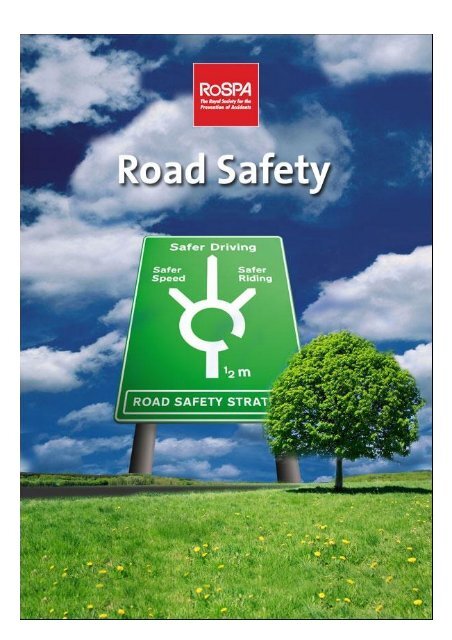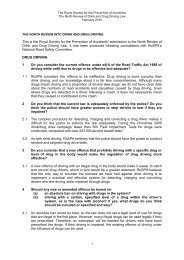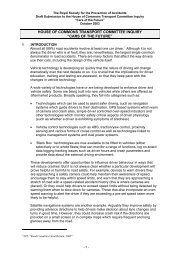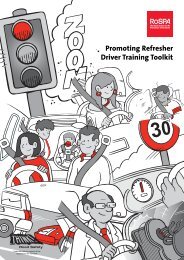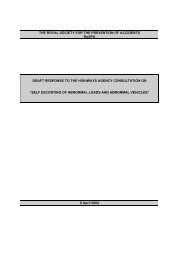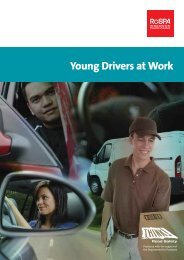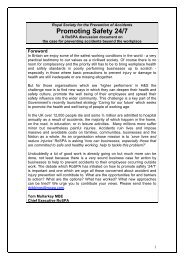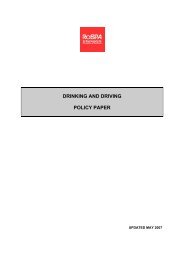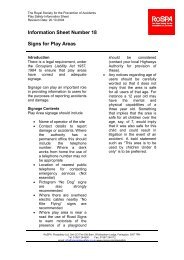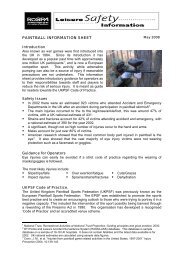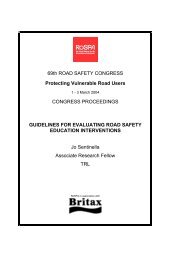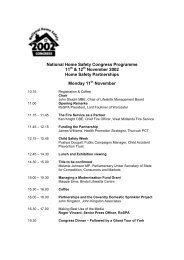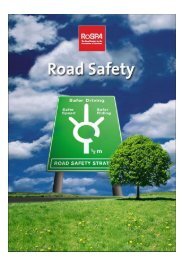RoSPA Road Safety
RoSPA Road Safety
RoSPA Road Safety
You also want an ePaper? Increase the reach of your titles
YUMPU automatically turns print PDFs into web optimized ePapers that Google loves.
<strong>RoSPA</strong>‟s <strong>Road</strong> <strong>Safety</strong> Work<br />
August 2009<br />
CONTENTS<br />
Introduction 1<br />
<strong>Road</strong> <strong>Safety</strong> 2<br />
Advice, Help, Training and Information 3<br />
<strong>Road</strong> <strong>Safety</strong> Education 7<br />
Supporting Professionals and Practitioners 11<br />
Helping Employers 15<br />
Supporting National <strong>Road</strong> <strong>Safety</strong> Strategies 22<br />
<strong>RoSPA</strong> <strong>Road</strong> <strong>Safety</strong> in Wales 25<br />
<strong>RoSPA</strong> <strong>Road</strong> <strong>Safety</strong> in Scotland 27<br />
<strong>RoSPA</strong> <strong>Road</strong> <strong>Safety</strong> in Europe and Beyond 29
<strong>RoSPA</strong>‟s <strong>Road</strong> <strong>Safety</strong> Work<br />
August 2009<br />
INTRODUCTION<br />
<strong>RoSPA</strong> is an independent, registered charity which was created in 1917 in response to an<br />
'alarming increase in traffic accidents‟ in London. Today, <strong>RoSPA</strong> promotes safety in all areas<br />
of life – on the road, in the home, at work, in schools, at leisure and on or near water. Our<br />
aim is to Save Lives and Reduce Injuries.<br />
The breadth of <strong>RoSPA</strong>‟s expertise allows us to draw lessons from different areas, schools of<br />
thought and approaches to injury prevention. Indeed, this is how <strong>RoSPA</strong> began its Managing<br />
Occupational <strong>Road</strong> Risk campaign in 1996, which has led to „at-work road safety‟ being a<br />
key priority in the UK‟s road safety strategy today. Other examples of <strong>RoSPA</strong>‟s contribution<br />
to road safety over the years include the formation of a national network of local road safety<br />
committees (the forerunner of today‟s local authority road safety officer service), the National<br />
Cycling Proficiency Scheme, the Tufty Club, compulsory seat belt wearing (<strong>RoSPA</strong>‟s<br />
President introduced an amendment to the Transport Bill in 1981), and the ban on using a<br />
hand-held mobile phone while driving.<br />
<strong>Safety</strong> organisations can be accused of taking safety problems too seriously and<br />
encouraging „hypersafety‟, „excessive risk aversion‟ and the „nanny state‟. However,<br />
“Absolute safety” is neither feasible nor desirable, since it would come at such cost to our<br />
freedoms. Common sense and balance is essential when developing and promoting safety<br />
interventions. There are clearly areas where prescription, through regulation, legislation or<br />
standards, is essential, for example, the nuclear, chemical or aviation industries. On the<br />
other hand, people need to be able to get on with their lives and be free to decide what risks<br />
they wish to take, provided they are not putting others in danger.<br />
The difficulty is where to draw the line - too prescriptive, and accusations of the “nanny state”<br />
fly around; too casual and people would undoubtedly be forced to take unknowing risks.<br />
<strong>RoSPA</strong> draws the line with two simple questions:<br />
1) Is the intervention proportionate to the risk? If the<br />
problem is not that great, steer towards the lighter<br />
touch, but if the evidence demands more<br />
guidance, consider intervention.<br />
2) What would be the effect on others? Someone<br />
who puts only themselves at risk should have the<br />
freedom to do so; but if an act can kill or injure<br />
others, it must be proscribed or regulated. A solo<br />
mountain climber fits into the first category; a<br />
speeding motorist the second.<br />
<strong>RoSPA</strong>‟s Approach to <strong>Safety</strong> is discussed in further detail in our Chief Executive‟s Report for<br />
the 2007/08 Annual Review and at www.rospa.com/aboutrospa/rospa_safetypoints.htm.<br />
1
<strong>RoSPA</strong>‟s <strong>Road</strong> <strong>Safety</strong> Work<br />
August 2009<br />
ROAD SAFETY<br />
Great Britain has one of the best road safety records in Europe and the world. Despite<br />
massive increases in traffic over the last few decades, the number of people killed on our<br />
roads has fallen from around 5,500 per year in the mid 1980s to just over 2,500 in 2008.<br />
However, this still means that around 7 people die on Britain‟s roads every day.<br />
<strong>Road</strong> Casualties in Great Britain, 2008<br />
Killed 2,538<br />
Seriously Injured 26,034<br />
Slightly Injured 202,333<br />
All 230,905<br />
Common causes of these unnecessary tragedies include:<br />
Speeding<br />
Over 700 people are killed when someone exceeds the speed limit or drives too fast for the<br />
conditions.<br />
Drink Driving<br />
Over 450 people die in crashes in which someone was over the legal drink drive limit.<br />
Seat Belt Wearing<br />
Nearly 400 lives each year could be saved if everyone always wore their seat belt.<br />
Careless Driving<br />
Over 400 deaths involve someone being „careless, reckless or in a hurry‟.<br />
At-work<br />
Around one third of fatal and serious road crashes involve someone who was at work.<br />
Inexperience<br />
Over 300 newly-qualified drivers and their passengers are killed in car crashes a year.<br />
<strong>Road</strong> safety is one of the most important areas of <strong>RoSPA</strong>‟s work. As almost all road crashes<br />
involve human error, ranging from simple mistakes to deliberate dangerous and illegal<br />
behaviour, our key issue is the need to improve the standard of driving and riding. <strong>RoSPA</strong><br />
supports a twin-track approach of making it as easy as possible to use the roads safely and<br />
responsibly and voluntarily and willingly comply with road traffic law, and of increasing the<br />
likelihood of catching, and the punishment for, those who choose not to do so.<br />
<strong>RoSPA</strong>:<br />
Raises awareness and provides advice, help, training and information for all road users<br />
and the general public<br />
Provides road safety education resources and guidance<br />
Provides advice and guidance, practical products and services to help employers<br />
manage their occupational road risk<br />
Supports the work of other professionals and practitioners in road safety<br />
Supports the development and implementation of national road safety strategies<br />
2
<strong>RoSPA</strong>‟s <strong>Road</strong> <strong>Safety</strong> Work<br />
August 2009<br />
ADVICE, HELP, TRAINING AND INFORMATION<br />
<strong>RoSPA</strong> provides advice, information, education, training and publicity resources and services<br />
for many different audiences: the public, safety professionals and practitioners, schools and<br />
other educational establishments, employers and the government.<br />
The Public<br />
<strong>RoSPA</strong> runs a <strong>Road</strong> <strong>Safety</strong> Information Service, with funding from the Department for<br />
Transport, to provide free, simple and clear information and advice to the public. <strong>RoSPA</strong> staff<br />
answers thousands of road safety enquiries from the public by email, letter or phone each<br />
year.<br />
Online Advice<br />
Through its many websites, <strong>RoSPA</strong> provides advice and information to millions of people<br />
worldwide every year, offering clear solutions to practical problems. Between them, the<br />
websites attract 70+ million hits, 3.6 million visitors and nearly a million downloads per year.<br />
www.rospa.com/roadsafety<br />
<strong>RoSPA</strong>‟s main website, www.rospa.com, includes a<br />
comprehensive road safety section,<br />
www.rospa.com/roadsafety, containing a wide range<br />
of free road safety resources for drivers, riders,<br />
schools, parents and employers, advice and<br />
information factsheets on many road safety topics<br />
and copies of <strong>RoSPA</strong> responses to road safety<br />
consultations.<br />
The road safety section receives around 700,000 visits each year and road safety documents<br />
are downloaded around 600,000 times<br />
www.childcarseats.org.uk<br />
<strong>RoSPA</strong>‟s website on child car seats provides<br />
free advice on choosing, fitting and using<br />
child car restraints, and receives 700,000<br />
visits a year, with advice sheets being<br />
downloaded around 40,000 times.<br />
www.helpingLdrivers.com<br />
<strong>RoSPA</strong>‟s website to provide help and advice<br />
to parents who have children who are<br />
learning to drive or ride,<br />
www.helpingLdrivers.com, receives over<br />
87,000 visits each year<br />
3
<strong>RoSPA</strong>‟s <strong>Road</strong> <strong>Safety</strong> Work<br />
August 2009<br />
www.orsa.org.uk<br />
<strong>RoSPA</strong> runs the website of the Occupational<br />
<strong>Road</strong> <strong>Safety</strong> Alliance, designed to help<br />
employers manage work related road safety,<br />
which receives over 55,000 visits and<br />
documents are downloaded over 15,000<br />
times.<br />
www.stoppingdistances.org.uk<br />
<strong>RoSPA</strong>‟s online simulator is designed to<br />
highlight the effect speed and driver<br />
impairment has on pedestrian safety, and is<br />
used 100,000 times a year.<br />
<strong>RoSPA</strong>‟s other safety related websites include www.youngworker.co.uk,<br />
www.lasersafety.org.uk, www.saferfireworks.com and www.roadar.org.<br />
Twitter<br />
<strong>RoSPA</strong> is also taking advantage of the latest communication tools, having recently launched<br />
a number of twitter sites, including twitter.com/roadsafety and twitter.com/rospa. Twitter is a<br />
'microblogging' platform which allows users to post short text messages (up to 140<br />
characters in length) via the internet. It‟s a great way of keeping in touch with people by<br />
exchanging quick, frequent emails about „what you‟re doing‟.<br />
Media<br />
Another crucial way that <strong>RoSPA</strong> promotes road safety<br />
information, advice and comment is through the media.<br />
In the past year, <strong>RoSPA</strong> has been quoted in thousands<br />
of newspaper articles, written dozens of road safety<br />
features and carried out around 400 road safety<br />
television and radio broadcasts.<br />
Common road safety themes have been:<br />
Drivers using mobile Young and novice Drinking and<br />
phones<br />
drivers<br />
driving<br />
Speed-related<br />
New offences<br />
Changes to<br />
issues, including (especially Corporate prosecution<br />
speed limits, traffic Manslaughter and and<br />
calming, safety Causing Death by sentencing<br />
cameras<br />
Careless Driving) guidelines<br />
Driving for work Child seats and seat Child road<br />
belts<br />
safety<br />
Driving in wintry The state of Britain‟s Councils<br />
weather conditions roads<br />
switching off<br />
street lights<br />
Pedestrian safety Mobility scooters Older drivers<br />
Lighter<br />
evenings<br />
Uninsured<br />
and<br />
unlicensed<br />
drivers<br />
Cycling<br />
safety<br />
<strong>Safety</strong> on<br />
rural roads<br />
4
<strong>RoSPA</strong>‟s <strong>Road</strong> <strong>Safety</strong> Work<br />
August 2009<br />
Some of the more unusual road stories <strong>RoSPA</strong> has dealt with over the last year include a<br />
driver watching a DVD while driving, another carrying a large palm tree and petrol being<br />
siphoned from cars due to the recession.<br />
Individual <strong>Road</strong> Users<br />
With DfT funding, <strong>RoSPA</strong> has produced a wide range of free resources for specific road<br />
users: drivers, motorcyclists, pedestrians, pedal cyclists, and parents. These can be found at:<br />
www.rospa.com/roadsafety/resources/drivers.htm<br />
www.rospa.com/roadsafety/toptentips/index.htm<br />
www.stoppingdistances.org.uk/<br />
www.rospa.com/roadsafety/resources/motorcyclists.htm<br />
www.rospa.com/roadsafety/resources/pedalcyclists.htm<br />
www.rospa.com/roadsafety/resources/parents.htm<br />
www.childcarseats.org.uk/<br />
www.helpingldrivers.com/<br />
In addition, many other resources are produced for sale, and can be used as part of<br />
education or training initiatives or as standalone resources to raise awareness and improve<br />
knowledge.<br />
5
<strong>RoSPA</strong>‟s <strong>Road</strong> <strong>Safety</strong> Work<br />
August 2009<br />
<strong>RoSPA</strong> Advanced Drivers and Riders (ROADAR)<br />
<strong>RoSPA</strong> Advanced Drivers and Riders is a network of over 50 local<br />
groups around the UK, whose aim is to reduce road accidents by<br />
encouraging an interest in road safety and by improving driving and<br />
riding standards, knowledge and skill. The Groups, many of which<br />
have motorcycle sections, have trained and experienced tutors<br />
willing to offer free advice, assessments and support to help drivers<br />
and motorcyclists prepare for the <strong>RoSPA</strong> Advanced Driving test or<br />
the <strong>RoSPA</strong> Advanced Motorcycling test.<br />
ROADAR began life in 1955, when Louise Duncan and others formed, the Finchley League<br />
of Safe Drivers. They organised lectures by the police and, together with some on-the-road<br />
training, eventually instituted a system of testing run by police driving instructors from<br />
Hendon. The organisation grew and spread across the country, and in April 1960, the<br />
League of Safe Drivers was formed. It had two patrons, Mrs Margaret Thatcher (MP for<br />
Finchley) and Mr. Raymond Baxter. The League required its members to take tests at regular<br />
intervals and offered a three tier grading system.<br />
In 1980, <strong>RoSPA</strong>, which had been involved with the organisation from the earliest days, took<br />
over the League, which became the <strong>RoSPA</strong> League of Safe Drivers, and in 1982, the <strong>RoSPA</strong><br />
Advanced Drivers' Association. The Association has gone from strength to strength ever<br />
since, due in large measure to the enthusiasm and commitment of the local groups and the<br />
quality and consistently high standard of the tests conducted by the examiners.<br />
The current name, <strong>RoSPA</strong> Advanced Drivers and Riders, reflects the changing membership<br />
profile, and includes all motorists, riders of motorcycles and scooters as well as car and other<br />
drivers. Membership is open to those who have taken or who wish to train towards taking the<br />
Advanced Test. There are two types of membership:<br />
Associate member: Joined a RoADAR group to prepare for the advanced driving test.<br />
Full member: Have passed the advanced driving test, and take a re-test every three years to<br />
maintain their membership.<br />
One of the strengths of <strong>RoSPA</strong> Advanced Drivers and Riders is that all members are<br />
required to take regular, free re-tests.<br />
6
<strong>RoSPA</strong>‟s <strong>Road</strong> <strong>Safety</strong> Work<br />
August 2009<br />
ROAD SAFETY EDUCATION<br />
<strong>RoSPA</strong>‟s <strong>Road</strong> <strong>Safety</strong> and <strong>Safety</strong> Education Departments work<br />
together to produce a wide range of educational resources to help<br />
teachers and schools incorporate road safety education into the<br />
school curriculum and into normal lessons on maths, English, etc.<br />
Educational resources are produced for all age ranges, from preschool<br />
age children to young people who are graduating from school<br />
and beginning their working life.<br />
In addition to education resources, <strong>RoSPA</strong> also produce good practice guidelines for<br />
incorporating safety into wider school activities (for example, “”<strong>Road</strong> <strong>Safety</strong> Education: A<br />
Guide for healthy Schools” or “Dramatic Impact: A Guide for Commissioning Theatre-in-<br />
Education”) or for managing safety in schools (for example, “Minibus <strong>Safety</strong>; A Code of<br />
Practice”).<br />
Many of the resources are available free of charge, thanks to funding from the Department<br />
for Transport, and can be found at www.rospa.com/roadsafety/resources/teachers.htm.<br />
7
<strong>RoSPA</strong>‟s <strong>Road</strong> <strong>Safety</strong> Work<br />
August 2009<br />
Learning About <strong>Safety</strong> by Experiencing Risk (LASER)<br />
LASER is a powerful interactive approach to safety education that takes place outside the<br />
classroom. Its purpose is to educate and enable children so that they can begin to take some<br />
care of themselves and others in their immediate community.<br />
LASER schemes provide children with opportunities to learn about and practise personal life<br />
skills, encouraging them to recognise and deal with the challenges and opportunities they<br />
might encounter throughout life, including in the home, when travelling or doing leisure<br />
activities.<br />
There are about 200 LASER schemes operating around England. Some run all-year-round at<br />
permanent venues and others are annual events that open for one to four weeks in a variety<br />
of locations. The emergency services and local authority staff play a key role in many events.<br />
Schemes run under various names (for example, Crucial Crew, Junior Citizen or <strong>Safety</strong><br />
Rangers).<br />
With funding from the Department of Health, <strong>RoSPA</strong> identified all<br />
the schemes across the country, drew together good practice<br />
and published the “LASER Project Good Practice Guidelines”.<br />
These can be downloaded free from<br />
www.rospa.com/safetyeducation/laser/goodpractice.htm<br />
<strong>RoSPA</strong> then helped to form a voluntary Alliance of LASER Scheme providers to spread good<br />
practice and establish future standards, and since 2005, has been undertaking a programme<br />
of voluntary accreditation.<br />
<strong>RoSPA</strong> hosts the LASER Forum website, www.lasersafety.org.uk, which gives locations and<br />
contact details for permanent and annual schemes across the UK.<br />
8
<strong>RoSPA</strong>‟s <strong>Road</strong> <strong>Safety</strong> Work<br />
August 2009<br />
Child <strong>Safety</strong> Education Coalition (CSEC)<br />
<strong>RoSPA</strong>, in partnership with the National Children‟s Bureau (NCB), and with funding from the<br />
DCSF, has established a new organisation called the Child <strong>Safety</strong> Education Coalition, which<br />
will be based at <strong>RoSPA</strong>‟s offices in Birmingham.<br />
The CSEC will work to improve the provision of practical safety education to give more<br />
children and young people the skills, knowledge and confidence to keep themselves safe in a<br />
range of situations (for example, at home, at play or on the road) and so help reduce the<br />
likelihood of injury or harm to children and young people. <strong>RoSPA</strong> and NCB will also work<br />
together to co-ordinate the distribution of safety education for children and young people<br />
from all backgrounds. A key focus for CSEC will be vulnerable groups, for example: children<br />
from disadvantaged backgrounds who are often at the highest risk of preventable accidents.<br />
The objectives of the coalition are to:<br />
Define 'high quality practical safety education' for children and young people<br />
Increase the distribution, the capacity, and the take up of high quality practical safety<br />
education for children and young people<br />
Increase provision of high quality practical safety education for hard-to-reach,<br />
disadvantaged, disabled and in-care children and young people<br />
Research and evaluate the most effective types of practical safety education techniques<br />
Make links with safety education schools (PHSE) to ensure learning objectives remain<br />
consistent<br />
CSEC works to achieve its objectives in a number of ways:<br />
Policy and advocacy work partnership building, policy development and media work at<br />
national, regional and local levels.<br />
Building the evidence base for effective practice encouraging research and evaluation to<br />
identify what works; collecting, synthesizing and sharing effective practice; supporting<br />
new developments and innovations in line with the evidence.<br />
Information sharing disseminating information through an email network, website,<br />
newsletters, publications, conferences and training events at national and regional levels<br />
and developing resources for schools and other organisations that work with children and<br />
young people.<br />
Further details are available at www.csec.org.uk/, and from John Vallender<br />
CSEC Manager, 0121 248 2114, jvallender@rospa.com<br />
9
<strong>RoSPA</strong>‟s <strong>Road</strong> <strong>Safety</strong> Work<br />
August 2009<br />
AdRisk www.adrisk.com<br />
<strong>RoSPA</strong> is a partner in AdRisk, a European project aiming to reduce injuries among young<br />
people. <strong>RoSPA</strong> is co-ordinating a series of exercises to develop a map of injury prevention in<br />
England. This includes an overview of injury data, a list of key stakeholders and their<br />
resources and an overview of current and planned policy.<br />
One part of the project is to develop an inventory of organisations working in this field, and a<br />
list of current and planned projects aiming to reduce injury risk for young people aged 15 –<br />
25 years. One output from the project was to develop a series of resources for practitioners<br />
to share across Europe (See<br />
www.childsafetyeurope.org/csi/eurosafe2006.nsf/wwwVwContent/l3launchofresults.htm?Ope<br />
nDocument).<br />
Further details are available from Dr Jenny McWhirter, Risk Education Adviser, <strong>RoSPA</strong>,<br />
jmcwhirter@rospa.com.<br />
Learner Driver Discussion Groups<br />
<strong>RoSPA</strong> has provided consultancy support for the Transport Research Laboratory to develop<br />
and pilot learner driver discussion groups intended to support young learner drivers to think<br />
about the implications of becoming a driver. Feedback from the pilot suggests that the<br />
discussion groups, lasting around 2 hours, help young people to reflect on the benefits of<br />
becoming a driver and the needs of other road users. Through a series of activities it<br />
highlights that inexperienced drivers are amongst the most vulnerable road users, and<br />
provides opportunities for young people to plan in advance how they will cope with situations<br />
they can expect to encounter once they are drivers e.g. planning their own route in unfamiliar<br />
places, responding to unexpected events and coping with drunk passengers.<br />
Other Activities<br />
<strong>RoSPA</strong> has also provided consultancy support to an organisation developing materials for<br />
the new updated Think campaign materials for schools.<br />
Working with Young People<br />
<strong>RoSPA</strong> plans to involve young people more in the development of resources and activities<br />
intended to help them to stay safe in a variety of contexts. Cassius Francis<br />
(cfrancis@rospa.com) is developing a network of young people who will assist <strong>RoSPA</strong>.<br />
Cassius is currently working with a Birmingham school council to develop a response to a<br />
tragic accident in which a student was killed in a collision with a car while walking near her<br />
home.<br />
<strong>RoSPA</strong> is collaborating with the Changemakers Foundation, a national charity whose Future<br />
Leaders Programme is designed for organisations which want to improve or increase the<br />
ways that they engage with young people. Last year, an undergraduate at Birmingham<br />
university worked with <strong>RoSPA</strong> to investigate why young people express little interest in<br />
advanced driver training and how this might be improved.<br />
This year, a second young advocate from the Changemakers Foundation‟s Future Leaders<br />
Programme is currently working on a project, with <strong>RoSPA</strong>‟s support, to investigate the<br />
difficulties faced by young drivers in getting reasonably-priced motor insurance. The project<br />
involves a survey of young male drivers aged between 17 and 21 years, and is exploring the<br />
motoring experiences of young men, including the pricing of their car insurance and attitudes<br />
to driving. The survey questionnaire is available at<br />
www.rospa.com/roadsafety/youngmaledrivers/.<br />
10
<strong>RoSPA</strong>‟s <strong>Road</strong> <strong>Safety</strong> Work<br />
August 2009<br />
<strong>RoSPA</strong> Youth Network Facebook Group<br />
<strong>RoSPA</strong> has recently launched a new youth network via Facebook, the social networking site.<br />
The new group can be accessed via the youth website at www.teensafetyandrisk.com.<br />
The <strong>RoSPA</strong> youth network is aimed at teenagers aged 14-19 who:<br />
Want to learn more about how to keep themselves safe<br />
on the road, at leisure, in the home or in the workplace<br />
Want to campaign on issues of safety<br />
Want to raise awareness about potential risks amongst<br />
their peers<br />
Have been affected by accidents<br />
Are interested in careers in a safety-related profession or a job where safety will be<br />
important<br />
Any individual or group of young people who may have questions about <strong>RoSPA</strong>‟s youth<br />
group they can email us at tsr@rospa.com.<br />
11
<strong>RoSPA</strong>‟s <strong>Road</strong> <strong>Safety</strong> Work<br />
August 2009<br />
SUPPORTING PROFESSIONALS AND PRACTITIONERS<br />
<strong>RoSPA</strong> is a partnership organisation. Almost every Local Authority in the UK is a member of<br />
<strong>RoSPA</strong>‟s <strong>Road</strong> <strong>Safety</strong> Department, as are many Police Forces, companies and<br />
organisations. <strong>RoSPA</strong> works very closely with other organisations with the aim of developing<br />
and disseminating good practice in road safety.<br />
Information Centre<br />
The Infocentre ensures that users have access to the most up-to-date information and<br />
guidance. In addition to the hardcopy resources, the Centre subscribes to a range of<br />
electronic databases in all the key safety areas, including:<br />
the Infocentre's own web database<br />
<strong>RoSPA</strong> runs a unique Information Centre that offers an<br />
extensive enquiry service, answering hundreds of safetyrelated<br />
questions each month. The Information Centre<br />
holds information on all aspects of health and safety: road,<br />
workplace, home, risk education, product, water and<br />
leisure, as well as general reference resources and<br />
trade/product directories. There are over 26,000 books and<br />
journal articles within the collection at present, which<br />
continues to grow each month as new items are<br />
catalogued.<br />
Useful websites database - listing over 250 quality websites from the UK and beyond<br />
<strong>Safety</strong> products – a database compiled by Infocentre staff, listing over 600 safety-related<br />
products and 270 supplier/manufacturer details<br />
Croner CCH – Croner publications in the field of workplace health and safety,<br />
environment, safety education, case law and road transport operations<br />
SAX's Dangerous Properties of Industrial Materials on CD-ROM – the only reference that<br />
combines data on toxicological, fire, reactivity, explosive potential and regulatory<br />
information for approximately 26,000 substances<br />
OSH-PLUS Online – a database of EU and UK occupational safety and health legislation<br />
OSH-Update – an Internet service that contains ten bibliographic databases from<br />
worldwide authoritative sources<br />
Encyclopaedia of <strong>Road</strong> Traffic Law and Practice – covers all aspects of road traffic law<br />
and practice; reproduces relevant legislation and includes summaries of case law<br />
Transport Online – a comprehensive source of international transportation information,<br />
consisting of two bibliographic databases, International Transport Research<br />
Documentation (ITRD) and the Transportation Research Information Services database<br />
(TRIS)<br />
Lawtel legal database – a source for case law going back to 1980, along with full-text<br />
legislation<br />
12
<strong>RoSPA</strong>‟s <strong>Road</strong> <strong>Safety</strong> Work<br />
August 2009<br />
Professional Conferences and Seminars<br />
<strong>RoSPA</strong> annual <strong>Road</strong> <strong>Safety</strong> Congress attracts 300 delegates from across the UK and<br />
overseas, drawn from professional backgrounds: local authority road safety officers, highway<br />
safety engineers and elected members, senior civil servants, police and armed forces<br />
personnel, health service professionals, and consultants involved in road safety. Our 75th<br />
<strong>Road</strong> <strong>Safety</strong> Congress, '<strong>Road</strong> <strong>Safety</strong> Around the World in 2½ Days: Lessons for the UK', will<br />
explore what we can learn from how other countries address road safety and in particular:<br />
National, regional and global road safety strategies<br />
Global case studies of innovative road safety practices<br />
Major improvements nationally and locally<br />
Different approaches to those used in UK<br />
The work of organisations such as WHO, the UN, the EC and others<br />
This annual event is widely-regarded as the most comprehensive conference in the road<br />
safety calendar and is proud to be associated with our long-term sponsor Britax.<br />
<strong>Road</strong> <strong>Safety</strong> Congress 2010<br />
Around the World in 2 ½ Days: Lessons for the UK<br />
22 – 24 February 2010<br />
Holiday Inn, Stratford upon Avon<br />
www.rospa.com/road/index.htm<br />
One day seminars and other events are held throughout the year and throughout the UK.<br />
In addition, <strong>RoSPA</strong> gives road safety presentations at events run by other organisations.<br />
Over the last year, <strong>RoSPA</strong> officers have provided around 50 conference or seminar<br />
presentations or written papers and articles for many different audiences, including road<br />
safety practitioners, driver trainers, health and safety professionals, commercial companies,<br />
local authority elected members and scrutiny committees, trade associations and insurers.<br />
Professional Journals<br />
<strong>RoSPA</strong> publishes two professional road safety journals. “Care on the <strong>Road</strong>” is aimed at Local<br />
Authority <strong>Road</strong> <strong>Safety</strong> professionals and driving groups. “<strong>Safety</strong> Education” is aimed at<br />
schools and other educational establishment.<br />
13
<strong>RoSPA</strong>‟s <strong>Road</strong> <strong>Safety</strong> Work<br />
August 2009<br />
Professional Liaison<br />
<strong>RoSPA</strong>‟s National <strong>Road</strong> <strong>Safety</strong> Committee (NRSC) and <strong>Road</strong> <strong>Safety</strong> Advisory Group<br />
(RSAG) comprise experts from central and local government, research organisations,<br />
transport industry bodies and road user groups. They provide a national forum on road<br />
safety, both for <strong>RoSPA</strong> and the wider road safety community, enabling us to consult widely,<br />
obtain sound advice, develop and recommend policy, and provide feedback and guidance to<br />
the organisations represented, and through them to their constituent bodies.<br />
<strong>RoSPA</strong> also meets regularly with the many organisations and individuals who promote road<br />
safety to facilitate the exchange of ideas and information and enable closer working<br />
relationships.<br />
<strong>RoSPA</strong> has published a number of good practice guides for road safety professionals and<br />
practitioners, most of which can be downloaded free (thanks to funding from the Department<br />
for Transport) from www.rospa.com/roadsafety/resources/practitioners.htm.<br />
<strong>RoSPA</strong> <strong>Road</strong> <strong>Safety</strong> Membership<br />
Many organisations (local authorities, police forces, companies) and individuals are <strong>RoSPA</strong><br />
<strong>Road</strong> <strong>Safety</strong> Members, supporting our work in helping to prevent accidents, and also<br />
enjoying a range of benefits, including:<br />
discounts on products, resources, training courses, consultancy and events<br />
subscription to <strong>RoSPA</strong>‟s bi-monthly journal, “Care on the <strong>Road</strong>”<br />
discounts on other <strong>RoSPA</strong> safety journals<br />
bi-monthly <strong>Road</strong> <strong>Safety</strong> E-Bulletin<br />
Members’ Website and Web Database<br />
The Infocentre section of the members‟ site provides an interactive service, through which<br />
Members may search the Infocentre's database of books, journal articles, guidance,<br />
conference proceedings and reports. The database Is searchable 24 hours a day, 7 days per<br />
week from anywhere in the world via the Member Zone, and covers all areas of safety<br />
including workplace, home, water, leisure, education, product and road. It includes<br />
approximately 26,000 reports, research studies, conference proceedings, articles from<br />
academic and consumer journals, standards, legislation and guidance. Members can borrow<br />
items for up to three weeks, and visit the Infocentre at our offices in Birmingham in person.<br />
Membership Certificate<br />
Members are issued with a, personalised, framed Membership certificate.<br />
<strong>RoSPA</strong> Member Logo<br />
<strong>RoSPA</strong> Members (excluding individual members) may use the exclusive <strong>RoSPA</strong><br />
Member logo on their company letterheads.<br />
For more details please contact the <strong>RoSPA</strong> Membership Department on 0121 248 2051 or<br />
email: membership@rospa.com<br />
14
<strong>RoSPA</strong>‟s <strong>Road</strong> <strong>Safety</strong> Work<br />
August 2009<br />
<strong>Road</strong> <strong>Safety</strong> Engineering Training<br />
<strong>RoSPA</strong> and TMS Consultancy run the UK‟s premier training courses for road safety<br />
engineers. The courses are accredited for CET and CPD by the major professional<br />
institutions.<br />
<strong>Road</strong> <strong>Safety</strong> Engineering (Accident Investigation and Prevention)<br />
This is a two-week residential course, designed to<br />
train delegates in road safety engineering techniques.<br />
Most of the course delegates are engineers and<br />
technicians from UK based Highway Authorities and<br />
commercial consultancies. Course members also<br />
include local authority road safety officers, police and<br />
military officers involved with traffic management<br />
issues, and road safety practitioners from overseas.<br />
The first week of the AIP course comprises a series of lectures and workshops that teach the<br />
techniques outlined in this manual. To a large extent, the subject areas covered in the<br />
manual follow the order that they are dealt with on the course.<br />
The second week of the course allows delegates to put the techniques that they have<br />
learned into practice in a real life situation. Local Highway Authorities provide real 'high risk'<br />
collision problem routes or areas, and the delegates investigate problems and evaluate<br />
potential solutions. The work is undertaken in multi-disciplinary project groups to enable the<br />
generation and discussion of ideas and alternative points of view. This interactive learning<br />
process produces great benefits for all delegates in terms of their ability and confidence to<br />
deal with similar situations when they return from the course to their work.<br />
The course culminates with groups preparing a report and making a presentation on their<br />
findings to the Highway Authority. Many of the Highway Authorities who provide sites either<br />
adopt some of the solutions or find the studies to be valuable reference when their own staff<br />
examine the sites.<br />
The two-week AIP course is now around 35 years old and has trained over 2,500 delegates,<br />
many of whom have gone on to senior positions in their organisations. Over the years the<br />
course has been regularly reviewed and updated to reflect changing policy and new<br />
initiatives. Many Highway Authorities and consultants ensure that their own staff have<br />
attended this course before they take part in safety engineering or safety audit projects.<br />
<strong>RoSPA</strong>/TMS also organise two related courses:<br />
A three-day introductory course (which is normally delivered to clients in-house and can<br />
be tailored to their needs)<br />
A five-day Advanced <strong>Safety</strong> Engineering course, generally for those who have already<br />
attended the 2 week AIP course and need to find out in more depth about current safety<br />
engineering issues<br />
More information on this training can be found through the TMS web site at<br />
www.tmsconsultancy.co.uk.<br />
15
<strong>RoSPA</strong>‟s <strong>Road</strong> <strong>Safety</strong> Work<br />
August 2009<br />
HELPING EMPLOYERS<br />
Driving is the most dangerous work activity that most people<br />
do. More people are killed or injured in at-work road<br />
accidents than in all other occupational accidents put<br />
together. About 200 people are killed or seriously injured<br />
every week in crashes involving someone who driving,<br />
riding or otherwise using the road for work.<br />
<strong>RoSPA</strong> began the campaign to promote the issue of<br />
Managing Occupational <strong>Road</strong> Risk in 1996. As a member of<br />
the Government‟s Work Related <strong>Road</strong> <strong>Safety</strong> Task Group,<br />
we helped to establish a national strategy on work-related<br />
road safety, including the development of the HSE guidance<br />
for employers on their duties to manage risk on the road, which states that “health and safety<br />
law applies to on-the-road work activities as to all work activities and the risks should be<br />
effectively managed within a health and safety system”.<br />
Linking together two key areas of safety management (road and occupational safety) <strong>RoSPA</strong><br />
has a unique approach to assist with occupational road risk. We have developed a wide<br />
range of approaches to persuade and help employers improve the safety of their road<br />
operations. We have produced several guidance resources and practical tools to help<br />
employers to assess their risk and take action to reduce it (see<br />
www.rospa.com/drivertraining). <strong>RoSPA</strong> also provides training courses for managers, and<br />
conducts regular seminars for Local Authorities, commercial companies, voluntary<br />
organisations and the emergency services.<br />
Free Guidelines<br />
<strong>RoSPA</strong> produces a wide range of free good practice advice for employers, including "Driving<br />
for Work" guides on several topics (for example, Safer Journey Planning, Driver Fitness),<br />
guidance about safer motorcycling for work, a Driving for Work film and advice for<br />
organisations that use volunteer drivers. These publications can be found at<br />
www.rospa.com/roadsafety/resources/employers.htm.<br />
<strong>RoSPA</strong> was a founder member of the<br />
Occupational <strong>Road</strong> <strong>Safety</strong> Alliance (ORSA) for<br />
which it provides the secretariat and designed<br />
and runs the website, www.orsa.org.uk.<br />
The website receives some 25,000 visits annually and guidance documents are downloaded<br />
from it almost 5,000 times a year.<br />
<strong>RoSPA</strong> Scotland is working with the Scottish Centre for Healthy Working Lives to launch the<br />
Scottish Occupational <strong>Road</strong> <strong>Safety</strong> Alliance (ScORSA).<br />
Managing Occupational <strong>Road</strong> Risk Events<br />
<strong>RoSPA</strong> conduct one day seminars for employers and managers on managing occupational<br />
road risk. Details of the latest events can be found at www.rospa.com/events/index.<br />
16
<strong>RoSPA</strong>‟s <strong>Road</strong> <strong>Safety</strong> Work<br />
August 2009<br />
Managing Occupational <strong>Road</strong> Risk Training<br />
Managing Occupational <strong>Road</strong> Risk<br />
This one day course is aimed at managers with responsibility for selecting and allocating<br />
company vehicles and managers and/or with responsibility for managing the workload of<br />
„occupational‟ drivers. The course is in line with HSE priorities as it examines ways in which<br />
to apply risk assessment techniques and safety management models to the specifics of roadrelated<br />
risks. It provides an understanding of the elements and benefits of a successful<br />
management of health and safety issues associated with fleet management and driving.<br />
Delegates will be able to identify their responsibilities and how risk on the road can be<br />
minimised for company vehicle and „occasional‟ drivers.<br />
Course details are available at<br />
www.rospa.com/occupationaltraining/coreskills/morr/index.htm.<br />
Managing Occupational <strong>Road</strong> Risk Masterclass<br />
<strong>RoSPA</strong>‟s new Managing Occupational <strong>Road</strong> Risk Masterclass focuses on tackling workrelated<br />
road safety with specific reference to the new Corporate Manslaughter and Corporate<br />
Homicide Act 2007. Aimed at senior managers and directors, the MORR Masterclass<br />
offers a full update on legal requirements, best practice and corporate social responsibility.<br />
Course details are available at<br />
www.rospa.com/occupationaltraining/coreskills/morr/masterclass.htm.<br />
<strong>RoSPA</strong>‟s Driver and Fleet Solutions (DFS) web pages (www.rospa.com/drivertraining)<br />
provide details of the many driver and rider assessment and training services available,<br />
including our online risk assessment tools.<br />
17
<strong>RoSPA</strong>‟s <strong>Road</strong> <strong>Safety</strong> Work<br />
August 2009<br />
Driver Development Training<br />
<strong>RoSPA</strong>‟s Driver and Fleet Solutions<br />
Department has a team of specialist driver<br />
trainers, and road safety and CMIOSH<br />
safety professionals. Our network of highly<br />
qualified fleet driver trainers is combined<br />
with accreditations from British Standards,<br />
the Driving Standards agency, Edexcel,<br />
Driver CPC and OCR.<br />
The Department provides a wide range of driver and rider assessment and training schemes,<br />
which cover all types of vehicles: cars, light vans, large goods vehicles, minibuses, buses<br />
and coaches, motorcycles. It also provides both online and in-vehicle driver assessments to<br />
help employers identify and prioritise their training needs, and driving tests to help measure<br />
and evaluate the effectiveness of the training. Our portfolio of courses include:<br />
In-vehicle assessment (all types of vehicle)<br />
Driver Development (all types of vehicle)<br />
Driver Theory Workshops<br />
Advanced Driving and Riding Courses<br />
Advanced Driving and Riding Test<br />
<strong>RoSPA</strong> Occupational Advanced Driving Test (RoADTEST)<br />
<strong>RoSPA</strong> National Minibus Test<br />
Managing <strong>Road</strong> Risk for Managers<br />
Banksman Course<br />
Banksman Assessor Course<br />
SAFED (Safe and Fuel Efficient Driving) Course<br />
ECO Driving Course<br />
UK familiarisation Course<br />
4 x 4 Professional Off-road course<br />
E-learning courses<br />
Driver Assessor courses<br />
<strong>RoSPA</strong> National Diploma in Advanced Driving Instruction (see below)<br />
<strong>RoSPA</strong> National Diploma in Advanced Motorcycling Instruction (see below)<br />
<strong>RoSPA</strong> National Diploma in Advanced LGV Instruction (see below)<br />
CPC National road Haulage (see below)<br />
CPC national Passenger Transport (see below)<br />
Chauffer Courses<br />
Personal <strong>Safety</strong><br />
Delegates on many of <strong>RoSPA</strong>‟s courses are eligible for a Level 2 or 3 BTEC Qualification.<br />
Emergency Driving Course<br />
<strong>RoSPA</strong> and St John Ambulance have joined forces to develop and deliver an Emergency<br />
Driving Course, which <strong>RoSPA</strong> will deliver. The course is for any driver whose duties may<br />
involve driving in response to an emergency and drivers who currently drives under<br />
emergency conditions, but have not received any formal training or assessment within the<br />
past five years. All on-road training will be conducted within posted speed limits.<br />
Further details are available at www.rospa.com/drivertraining or 0121 248 2023.<br />
18
<strong>RoSPA</strong>‟s <strong>Road</strong> <strong>Safety</strong> Work<br />
August 2009<br />
Certificate of Professional Competence<br />
From 10 September 2008, all professional bus and coach drivers are required to have a<br />
Driver Certificate of Professional Competence. The same will apply to all LGV drivers from<br />
September 2009. <strong>RoSPA</strong> has been awarded Approved Centre status by the Joint Approval<br />
Unit for periodic Training (JAUPT) meaning a wide range of <strong>RoSPA</strong> courses are CPC<br />
approved. <strong>RoSPA</strong> also offers operator CPC courses for National Passenger transport and<br />
<strong>Road</strong> haulage managers that are accredited by the Oxford, Cambridge and Royal Society of<br />
Arts Examination Board (OCR).<br />
Instructor Courses<br />
As the fleet driver training industry becomes ever more discerning in its quest for quality<br />
instructors, the initial Approved Driving Instructor (ADI) qualification is seen as only the start<br />
of the learning process. <strong>RoSPA</strong>‟s Instructor courses have been designed to help driver<br />
trainers to instruct others to the same high standard demanded of <strong>RoSPA</strong> trainers. <strong>RoSPA</strong>‟s<br />
National Diploma allow instructors to reach their full potential:<br />
<strong>RoSPA</strong> National Diploma in Advanced Driving Instruction<br />
<strong>RoSPA</strong> National Diploma in Advanced Riding Instruction<br />
<strong>RoSPA</strong> National Diploma in Advanced LGV Instruction<br />
QUALITY MANAGEMENT<br />
<strong>RoSPA</strong>‟s Driver and Fleet Solutions Department operate a quality<br />
management system and is certified to BS EN ISO 9001:2000 for the<br />
registered activities of “Design, development, presentation and coordination<br />
of a range of published and tailored occupational safety<br />
and driver training courses held at <strong>RoSPA</strong> training locations or other<br />
venues specified by clients. The provision of the National Safe<br />
Driving Award scheme and the <strong>RoSPA</strong> Advanced Drivers<br />
Association”.<br />
In addition, the <strong>RoSPA</strong> Advanced Driving Test is externally<br />
quality assured by the Driving Standards Agency on an annual<br />
basis.<br />
The <strong>RoSPA</strong> National Diploma in Advanced Driving Instruction is<br />
also accredited by the Driving Standards Agency and allows<br />
direct entry onto the DSA Fleet Register of Driving Instructors.<br />
<strong>RoSPA</strong>‟s trainers and examiners are the best in the UK, with a long pedigree of police<br />
service or driver training experience. They are all a current Fleet Approved Driving Instructor<br />
(not just a normal ADI) and hold a DSA Grade 5 or 6, making them some of the most highly<br />
qualified instructors in the UK. In addition they must have passed <strong>RoSPA</strong>‟s Advanced Driving<br />
Test at Gold grade and hold <strong>RoSPA</strong>‟s National Diploma in Advanced Driving Instruction.<br />
19
<strong>RoSPA</strong>‟s <strong>Road</strong> <strong>Safety</strong> Work<br />
August 2009<br />
<strong>RoSPA</strong> is a member of the DSA‟s Lifelong Driver Development Working Group and the<br />
Steering Group and Working Group that is overseeing the development of Continuous<br />
Professional Development for Approved Driving Instructors.<br />
Details of <strong>RoSPA</strong>‟s Driver and Fleet Solutions<br />
courses, products and services can be found at<br />
www.rospa.com/drivertraining/index.htm and<br />
www.rospa.com/drivertraining/catalogue2009.pdf.<br />
Accreditation<br />
The <strong>RoSPA</strong> Accreditation Scheme provides a professional assessment of the content and<br />
delivery of an organisation‟s driver training course(s). A <strong>RoSPA</strong> accreditor visits the<br />
organisation to assess the training and trainers in action, review documentary evidence and<br />
course materials and interview relevant staff. A detailed Accreditation report is provided with<br />
practical advice and recommendations for improvement. If successful, <strong>RoSPA</strong> will accredit<br />
the training for the period of time specified. This is normally valid for two years, after which<br />
the course will need to be reaccredited to ensure that standards are being maintained.<br />
Organisations that have been successfully accredited may use the “Accredited by <strong>RoSPA</strong>”<br />
logo in association with the course(s) that have been accredited.<br />
Accreditation is available for organisations in the UK and overseas. It usually takes two days<br />
but can vary depending on specific requirements. It includes:<br />
Visit(s) by <strong>RoSPA</strong>‟s accreditor to assess the course and trainers in<br />
action<br />
Review of documentary evidence, including course syllabus and<br />
training materials<br />
Interviews with relevant staff<br />
Further details of <strong>RoSPA</strong>‟s Accreditation Scheme can be found at<br />
www.rospa.com/drivertraining/accreditation.htm.<br />
20
<strong>RoSPA</strong>‟s <strong>Road</strong> <strong>Safety</strong> Work<br />
August 2009<br />
MORR AWARDS<br />
<strong>RoSPA</strong> MORR Awards reward excellence and encourage improvement in this key<br />
operational area. Any organisation with a fleet of vehicles can enter the <strong>RoSPA</strong> Managing<br />
Occupational <strong>Road</strong> Risk Awards. Entrants need to demonstrate robust risk management<br />
systems and culture, as well as an improving work-related road accident record.<br />
Entries are judged on a combination of the verifiable<br />
historical performance data along with evidence of an<br />
effective and cohesive programme for managing road<br />
risk. The awards are made at gold, silver and bronze<br />
levels, and all entries are automatically considered for<br />
the MORR trophy.<br />
The <strong>RoSPA</strong> MORR Trophy<br />
This award is presented to the company or organisation that has most effectively managed<br />
its occupational road risks over the past 12 months. Previous winners include:<br />
2003 Palmer & Harvey McLane Ltd<br />
2004 Palmer & Harvey McLane Ltd<br />
2005 Planned Maintenance Engineering Ltd<br />
2006 BMW (UK) Ltd, Vehicle Distribution Centre<br />
2007 Tesco Dotcom Home Shopping Delivery<br />
2008 Scottish Power Fleet Business<br />
2009 Tesco Dotcom Home Shopping Delivery<br />
<strong>RoSPA</strong> National Safe Driving Award Scheme (NSDA)<br />
The <strong>RoSPA</strong> National Safe Driving Award Scheme (NSDA) is a low cost accident recording<br />
and rewarding system to provide an incentive for employee drivers to remain accident free.<br />
Reward for good driving is a well-proven and well-established part of a strategy for managing<br />
and reducing occupational road risk and improving staff morale. NSDA involves minimal<br />
administration, in which employees' driving records are held and annually updated by<br />
<strong>RoSPA</strong>. The scheme offers attractive incentives for individual company drivers to remain<br />
accident-free year after year, and can even be linked to an organisation's own bonus<br />
scheme.<br />
21
<strong>RoSPA</strong>‟s <strong>Road</strong> <strong>Safety</strong> Work<br />
August 2009<br />
ONLINE TOOLS<br />
Driver Profiler<br />
This online assessment allows managers to more easily<br />
identify 'at risk' drivers and organise a suitable training<br />
programme for them takes around 20 minutes to complete<br />
and consists of two sections, firstly identifying information<br />
personal to the driver such as accident history, mileage<br />
and they type of driving they do. The second section<br />
consists of a series of 98 statements about driving<br />
attitudes. The traits measured are: aggression, alertness,<br />
stress, dislike of driving, anticipation, attention, violation,<br />
and error.<br />
At the end of the assessment, employees receive an individual report which allows them to<br />
see 'at risk' areas of their driving and provides tips and advice to improve these areas.<br />
Managers are issued with a secure log in which allows them access to all of the drivers‟<br />
records and an overall risk rating for each.<br />
Our new and improved version of Driver Profiler has more colourful pages and clearer text<br />
making the system more user friendly for drivers. Enhanced management information system<br />
allows managers to more easily identify 'at risk' drivers and organise a suitable training<br />
programme for them. In addition, the new version has the option for companies to add their<br />
logo.<br />
For more details see www.rospa.com/drivertraining/managementinfo/driverprofiler.htm.<br />
Driver e-learning<br />
<strong>RoSPA</strong>‟s e-learning system can be used as an additional training tool for managers who are<br />
looking for an alternative or refresher to in-vehicle training. It enables companies to provide<br />
their drivers with key information vital to anyone driving at work, and allows them to do so<br />
quickly, conveniently and at a reduced cost.<br />
The new, flexible software aims to provide users with the<br />
knowledge to drive both safely and defensively at all<br />
times, and includes training on the following topics:<br />
Levels of risk on the road<br />
System of car control<br />
Defensive driving<br />
Factors affecting driving<br />
Vehicle technology<br />
Award-winning „Driving for Work‟ DVD<br />
For more details see www.rospa.com/drivertraining/software/driver_e_learning.htm.<br />
22
<strong>RoSPA</strong>‟s <strong>Road</strong> <strong>Safety</strong> Work<br />
August 2009<br />
SUPPORTING NATIONAL ROAD SAFETY STRATEGIES<br />
The UK is fortunate in having strong, long term government leadership in road safety. There<br />
have been national road safety strategies and casualty reduction targets for over 20 years,<br />
which is one of the reasons why deaths on the road have fallen from around 5,500 per year<br />
in the mid 1980s to around 2,500 a year in 2008, despite massive increases in traffic.<br />
The Department for Transport is currently developing Britain‟s road safety strategy for 2010<br />
to 2020 and beyond, “A Safer Way: Making Britain‟s <strong>Road</strong>s the Safest in the World”. The<br />
Scottish Government has published “Scotland‟s <strong>Road</strong> <strong>Safety</strong> Framework to 2020” and the<br />
Department of the Environment in Northern Ireland is beginning its consultation process on<br />
developing a new road safety strategy for Northern Ireland.<br />
<strong>RoSPA</strong>‟s <strong>Road</strong> <strong>Safety</strong> Department works hard to influence the development of these national<br />
strategies, and to support their implementation by the Government, and its Executive<br />
Agencies, and by the many stakeholders who help to deliver road safety in the UK.<br />
<strong>RoSPA</strong> officers sit on many government advisory groups, some of which advise on the broad<br />
development of road safety strategy and some of which advise on specific projects or<br />
interventions. Examples are:<br />
DfT<br />
<strong>Road</strong> <strong>Safety</strong> Advisory Panel<br />
Child <strong>Road</strong> <strong>Safety</strong> Sub-Group<br />
Cyclist Training Standards Board<br />
<strong>Road</strong> <strong>Safety</strong> Research Dissemination<br />
Cyclist <strong>Safety</strong> Research Programme<br />
Seatbelt Research<br />
Professional Skills for Delivering the Drink Driver Rehabilitation Scheme<br />
Active Traffic Management Stakeholders Group<br />
DSA<br />
Driving for Life Programme<br />
ADI Continuous Professional Development<br />
Introduction of the New Motorcycling Test<br />
Strategic Review<br />
<strong>RoSPA</strong> also has representatives on the committees and working groups of other road safety<br />
organisations, such as:<br />
Parliamentary Advisory Council for Transport <strong>Safety</strong> (PACTS)<br />
<strong>Road</strong>safe<br />
London Accident Prevention Council<br />
<strong>Road</strong> Users Alliance<br />
Association of Industrial <strong>Road</strong> <strong>Safety</strong> Officers (AIRSO)<br />
Motorists Forum Working Groups<br />
LARSOA School Crossing Patrol Service Working Group<br />
23
<strong>RoSPA</strong>‟s <strong>Road</strong> <strong>Safety</strong> Work<br />
August 2009<br />
Another way <strong>RoSPA</strong> seeks to influence national policy on road safety issues is to submit<br />
detailed and considered responses to government and European consultations on road<br />
safety related issues. <strong>RoSPA</strong> also submits written (and when invited, oral, evidence to House<br />
of Commons and House of Lords Select Committee Inquiries into road safety issues.<br />
All of <strong>RoSPA</strong>‟s responses to relevant consultations, and written submissions to Inquiries, are<br />
published at www.rospa.com/roadsafety/consultations/index.htm.<br />
Research<br />
Young Drivers at Work<br />
With funding from the DfT‟s <strong>Road</strong> <strong>Safety</strong> Partnership Grant, <strong>RoSPA</strong> is conducting a „Young<br />
Drivers at Work‟ project. Phase 1 of the project was completed during 2008/09 and involved a<br />
Young Drivers at Work Study among employers who have young staff who drive as part of<br />
their work and young at-work drivers themselves.<br />
Based on the findings of the study, <strong>RoSPA</strong> is developing and piloting a Young Drivers at Work<br />
Workshop, aimed at young at-work drivers (rather than their managers or employers). An<br />
online guide for employers, and others (e.g., road safety officers, driver trainers) will be<br />
produced, containing the workshop structure and materials and a guide to its delivery. This<br />
will be freely available.<br />
The aims are to:<br />
The study found that both employers and young at-work drivers<br />
think that the current learning to drive process (training and test)<br />
does not fully prepare young drivers for the type of driving that they<br />
are required to do for work, identified a number of specific issues<br />
and confirmed that employers would value some form of driving for<br />
work qualification. Details of the study and a copy of the final<br />
report can are available at<br />
www.rospa.com/roadsafety/youngdriversatwork/index.htm.<br />
Develop the participants‟ knowledge that driving for work has „issues‟ above and beyond<br />
what they probably assimilated when learning to drive, and to give them an idea of the<br />
main issues<br />
Help young at-work drivers understand how they can develop the additional skills they<br />
need when driving for work<br />
Produce a free online How To Guide intended to encourage and enable employers and<br />
others to deliver Young Drivers At Work Workshops, and/or to provide other follow-up<br />
support for their young drivers<br />
Contribute to the DSA‟s development of a wider post-test driver training syllabus and<br />
inform the implementation of Role 5 of the DSA Competency Framework, “Review and<br />
Adjust Driving Behaviour over a lifetime.”<br />
24
<strong>RoSPA</strong>‟s <strong>Road</strong> <strong>Safety</strong> Work<br />
August 2009<br />
<strong>RoSPA</strong>/BNFL Scholarship Scheme<br />
Thanks to a bequest from BNFL (British Nuclear Fuels Ltd), <strong>RoSPA</strong> has established a<br />
£500,000 scholarship scheme which will fund two to three scholarships a year for a decade,<br />
including for example, PhDs and shorter research projects. The scholarships aim to enable<br />
individuals and teams, in the UK and overseas, to carry out research into safety and accident<br />
prevention issues that will produce defined, practical and influential outcomes to help save<br />
lives and prevent injuries. Applications are invited annually for projects in the range of £6,000<br />
to £20,000 which address key safety themes including:<br />
<strong>Road</strong>: 'To improve standards of driving behaviour'<br />
Home: 'To reduce home and leisure accidents'<br />
Work: 'To raise standards of health and safety management'<br />
Water and Leisure: 'To reduce injuries in water and leisure activities'<br />
<strong>Safety</strong> Education: 'To enhance risk understanding and awareness'<br />
General <strong>Safety</strong>: 'To increase public awareness of safety and accident prevention'<br />
The first road safety winner of the <strong>RoSPA</strong>/BNFL Scholarship Scheme is Staffordshire County<br />
Council.<br />
Working with Keele University and with support from <strong>RoSPA</strong>, Staffordshire‟s project is to<br />
evaluate the effectiveness of a crucial element of their Young Drivers Coaching programme:<br />
a Resource to improve the relationship between the parent, young driver and professional<br />
driving instructor during the young driver‟s learning period.<br />
This project won for several reasons:<br />
Firstly, it addresses one of the key road safety issues that we face – the high risk that young<br />
and inexperienced drivers face and create. Young drivers are over-represented in road<br />
casualty statistics, and are at a particularly high risk during the first year or so of driving.<br />
Secondly, Staffordshire‟s Coaching programme builds, in an innovative manner, on one of<br />
the proven ways of reducing this risk – enhancing the amount and quality of supervised<br />
driving during the learning period. It also seeks to engage parents more in their children‟s<br />
learning to drive process, which is an area that is increasingly recognised as having<br />
significant potential to produce better, safer young drivers. Taking private practice in the<br />
family car under a parent‟s supervision, in addition to professional lessons with a driving<br />
instructor, is a valuable part of learning to drive, but the quality of such private practice is<br />
variable with one survey revealing that 31% of 18-29 year olds had picked up „bad habits‟<br />
from their parents during practice sessions.<br />
Finally, Staffordshire‟s project is about evaluating the effectiveness of a road safety measure<br />
in order to ensure that it works well, and to provide lessons for others who wish to replicate<br />
this approach, as well as aiding further development of the coaching programme. This type<br />
of evaluation is essential, and is becoming a fundamental feature of the delivery of all road<br />
safety measures. This research is timely and will provide the first UK evaluation of a learner<br />
driver programme involving ADIs and parents/supervising drivers.<br />
In short, Staffordshire County Council‟s project ticks all the right boxes and is exactly the sort<br />
of innovative and practical research that the <strong>RoSPA</strong>/BNFL Scholarship Scheme is designed<br />
to support.<br />
25
<strong>RoSPA</strong>‟s <strong>Road</strong> <strong>Safety</strong> Work<br />
August 2009<br />
Children In and Around Cars<br />
<strong>RoSPA</strong>‟s <strong>Road</strong> <strong>Safety</strong> Department is also conducting new research into the extent of<br />
children being killed or injured when they are struck by vehicles on driveways. In 2007, three<br />
children aged one to two-years-old were killed when they were travelling in cars on Britain‟s<br />
roads. An analysis of press reports from 2007 revealed that three children in the same age<br />
group were killed after being struck by vehicles on driveways. And press cuttings from 2008<br />
reveal that at least eight children aged up to seven-years-old died after being struck by<br />
vehicles on driveways or elsewhere in the grounds of their home.<br />
<strong>RoSPA</strong> began looking into this problem after it was approached by the family of a toddler<br />
who was killed when he was struck by a car on the driveway of his home. The family is now<br />
striving to raise awareness of the issue and has set up the Iain Goodwill Trust (www.iainstrust.org)<br />
to help prevent others enduring similar tragedies.<br />
The <strong>RoSPA</strong> survey - at www.rospa.com/childrenincars - is among parents, grandparents,<br />
guardians and carers of children aged up to seven-years-old to gather information about<br />
other incidents involving children on driveways. It is also addressing the issue of children<br />
being left alone in cars, following a number of incidents in which vehicles have been stolen<br />
with children inside; children have been left inside cars in hot weather; or children have<br />
managed to start or manoeuvre cars by themselves. Our survey will enable us to understand<br />
how these types of incidents happen and we will use the information to develop the very best<br />
advice to help parents and carers keep young children safe.”<br />
The survey will remain open until December 18 2009.<br />
26
<strong>RoSPA</strong>‟s <strong>Road</strong> <strong>Safety</strong> Work<br />
August 2009<br />
<strong>RoSPA</strong> WALES<br />
<strong>RoSPA</strong> has maintained an office in Cardiff for over 50 years and as a result of this<br />
experience is recognised as an ideal organisation to act as an interface between the major<br />
road safety organisations in Wales. <strong>RoSPA</strong> Wales is committed to working closely with the<br />
Welsh Assembly Government, Local Authorities, the Emergency Services, the media,<br />
voluntary groups and other interested parties within Wales, to address the road safety<br />
problems within the country. <strong>RoSPA</strong> Wales seeks to be proactive as well as reactive in its<br />
function and leads, recommends and develops issues that it considers will bring about<br />
greater awareness of road safety and further progress in casualty reduction.<br />
Most of <strong>RoSPA</strong>‟s work in Wales is funded by a grant from the Welsh Assembly Government.<br />
It is categorised into seven defined roles:<br />
<strong>Road</strong> <strong>Safety</strong> Publicity and Public Relations<br />
The media is central to the process of awareness raising and the development of knowledge<br />
and understanding about road safety issues. It is, therefore, important for <strong>RoSPA</strong> to<br />
maintain an efficient and effective ability to respond to media enquiries, as well as adopting a<br />
pro-active role in promoting specific issues to the media. Through contacts within Wales, its<br />
key road safety organisations and other groups, <strong>RoSPA</strong> identifies important and pertinent<br />
road safety issues in Wales which are ripe for attention.<br />
In addition to publishing press releases on specific issues, <strong>RoSPA</strong> receives many unsolicited<br />
enquiries, and continues to be highly regarded by the media as one of the most prominent<br />
organisations to turn to for independent comment on road safety matters. <strong>RoSPA</strong>, through<br />
its Advisory Committees, specialists, technical officers and Press Office is ideally placed to<br />
act as spokesperson on such matters. With this back-up, the <strong>Road</strong> <strong>Safety</strong> Manager carries<br />
out this function in Wales on behalf of <strong>RoSPA</strong><br />
<strong>Road</strong> <strong>Safety</strong> Information and Advice<br />
<strong>RoSPA</strong> Wales provides the general public, the commercial sector, the voluntary sector,<br />
politicians and road safety agencies with accurate, relevant and up to date information on all<br />
issues affecting road users in Wales both proactively and reactively. <strong>RoSPA</strong> Wales receives<br />
a substantial number of enquires and requests for road safety information and support from<br />
all such groups.<br />
<strong>Road</strong> <strong>Safety</strong> Liaison and Collaboration<br />
The road safety movement in Wales, like the UK as a whole, has many key players, each of<br />
which makes a distinctive contribution. These range from central and local government,<br />
professional organisations and voluntary bodies, and <strong>RoSPA</strong> believes that road safety<br />
successes in recent years are the result of a concerted multi-agency approach to the<br />
problems that exist. <strong>RoSPA</strong> plays a unique role in Wales in helping to co-ordinate, support,<br />
complement and stimulate the work that is being undertaken by working effectively with the<br />
appropriate agencies.<br />
<strong>Road</strong> <strong>Safety</strong> Education and Communication<br />
<strong>RoSPA</strong> believes that co-ordination between the twenty-two local authorities in Wales is of<br />
paramount importance if road users are to get the best service delivery that they can. Many<br />
road safety initiatives will derive extra benefit if resources and services are produced jointly<br />
and centrally. <strong>RoSPA</strong> has a track record of effectively co-ordinating the production and<br />
27
<strong>RoSPA</strong>‟s <strong>Road</strong> <strong>Safety</strong> Work<br />
August 2009<br />
delivery of resources.<br />
<strong>Road</strong> <strong>Safety</strong> Wales Projects Interface<br />
<strong>RoSPA</strong> has long been associated with the <strong>Road</strong><br />
<strong>Safety</strong> Wales Partnership (previously RoSCoW) and<br />
has been instrumental in bringing about change and<br />
progress within it. <strong>RoSPA</strong> recognises the<br />
effectiveness and value of many of the projects<br />
detailed in the annual RSW Business Plan and<br />
because of <strong>RoSPA</strong>‟s traditional, unique role and<br />
considerable experience implements, manages, coordinates<br />
and supports many of its projects.<br />
Evaluation of <strong>Road</strong> <strong>Safety</strong> Projects and Analysis of Data<br />
<strong>RoSPA</strong> has considerable expertise and experience in evaluating road safety education,<br />
training and publicity projects. <strong>RoSPA</strong> is also able to analyse specific casualty and other data<br />
that is not readily available from other sources. <strong>RoSPA</strong> monitors and evaluates local and<br />
national road safety initiatives and analyse accident data and make recommendations<br />
accordingly.<br />
Government Liaison<br />
<strong>RoSPA</strong> liaises with the Assembly Government on progress of its core and short-term<br />
programmes, as well as regular contact regarding developing road safety issues. <strong>RoSPA</strong><br />
monitors and reports on grant-related activity and other relevant matters.<br />
28
<strong>RoSPA</strong>‟s <strong>Road</strong> <strong>Safety</strong> Work<br />
August 2009<br />
<strong>RoSPA</strong> SCOTLAND<br />
<strong>RoSPA</strong>‟s first influence in Scotland began in Glasgow in 1930 as the “<strong>Safety</strong> First” Council.<br />
<strong>RoSPA</strong>‟s knowledge and expertise is used to promote injury prevention and casualty<br />
reduction throughout Scottish communities.<br />
Most of <strong>RoSPA</strong>‟s work in Scotland is funded by a grant<br />
from the Scottish Government, and aims to contribute<br />
towards the achievement of the government‟s <strong>Road</strong><br />
<strong>Safety</strong> Framework and National Strategic Objectives.<br />
Information and Advice<br />
<strong>RoSPA</strong>‟s reputation in Scotland is well established. An important role is the provision of<br />
reliable and well researched information along with independent advice. This is achieved<br />
through responding to many enquiries by email, letter and telephone from members of the<br />
public, road safety professionals, local authorities and government officials, to name a few.<br />
<strong>RoSPA</strong> Scotland works closely in partnership with other proactive and influential road safety<br />
organisations from all disciplines including engineering, fire and rescue services, education,<br />
police forces and others by sharing knowledge, ideas and good practice.<br />
Media and publications<br />
<strong>RoSPA</strong> Scotland recognises the importance of the media in conveying the road safety<br />
message to the general public and regularly issues press releases. In turn the media<br />
acknowledges the value of a <strong>RoSPA</strong> spokesperson by frequently requesting radio and<br />
television interviews, often relating to high profile topics of interest in the public eye or in<br />
regard to changes in legislation. In addition, <strong>RoSPA</strong> writes articles for publication in relevant<br />
journals, e-bulletins and newspapers.<br />
Government Liaison<br />
<strong>Road</strong> safety within <strong>RoSPA</strong> Scotland is funded by the Scottish Government with whom<br />
<strong>RoSPA</strong> Scotland liaises closely, frequently participating in meetings and events organised by<br />
the Scottish Government. In addition <strong>RoSPA</strong> Scotland responds to relevant Scottish<br />
Government consultation documents. The “Scotland‟s <strong>Road</strong> <strong>Safety</strong> Framework to 2020”,<br />
which is due to be published later in 2009 by the Scottish Government, will inform <strong>RoSPA</strong><br />
Scotland‟s road safety business plan for future years.<br />
Training Programmes<br />
<strong>RoSPA</strong> Scotland is committed to delivering quality training for road safety practitioners.<br />
Over the past six years the annual programme has included facilitating in-car safety training<br />
for road safety officers whose remit includes conducting child car seat checks. Other<br />
training courses are organised on themes and topics suggested by road safety practitioners<br />
themselves (such as partnership working, drink driving, young drivers, evaluating road safety<br />
schemes) and are at CPD level. <strong>RoSPA</strong> training courses are frequently carried out in<br />
partnership with other relevant organisations such as the Scottish Group of the Institute of<br />
<strong>Road</strong> <strong>Safety</strong> Officers (IRSO), the Fire and Rescue Service and the Scottish Accident<br />
Prevention Council (SAPC). <strong>RoSPA</strong> Scotland is currently considering the development of<br />
an accredited course for road safety practitioners working in Scotland.<br />
29
<strong>RoSPA</strong>‟s <strong>Road</strong> <strong>Safety</strong> Work<br />
August 2009<br />
Partnership Working<br />
<strong>RoSPA</strong> Scotland endeavours to maintain contact and provide support where requested with<br />
the Scottish RoADAR groups<br />
Over many years <strong>RoSPA</strong> has provided the secretariat support for the Scottish Accident<br />
Prevention Council (SAPC) which has included the organisation of the SAPC annual<br />
conference.<br />
In 1984, in response to the news that 1986 was to be European <strong>Road</strong> <strong>Safety</strong> Year, <strong>RoSPA</strong><br />
Scotland met with the then Scottish Office and set up a steering group, made up of <strong>RoSPA</strong><br />
Scotland, SAPC, IRSO Scottish group and the Association of Chief Police Officers in<br />
Scotland, the outcome of which saw the formation of the Scottish <strong>Road</strong> <strong>Safety</strong> Campaign -<br />
now <strong>Road</strong> <strong>Safety</strong> Scotland (RSS). <strong>Road</strong> <strong>Safety</strong> Scotland develops road safety educational<br />
resources to fit with the Scottish curriculum and conducts media campaigns. <strong>RoSPA</strong><br />
Scotland liaises closely with RSS and is represented on RSS Forum and Publicity Sub<br />
Committee.<br />
<strong>RoSPA</strong> Scotland is a partner in the Scottish and European Child <strong>Safety</strong> Alliances, working<br />
alongside fire and rescue, child safety organisations, health and safety professionals to<br />
produce a Child <strong>Safety</strong> Action Plan for Scotland (CSAP). This CSAP is designed to support<br />
the Child <strong>Safety</strong> Action Plan project in Europe.<br />
Recent strategic level changes within the Scottish Government and local authorities have<br />
resulted in increased partnership working and the establishment of the Scottish Community<br />
<strong>Safety</strong> Network and Community <strong>Safety</strong> Partnerships. To reflect this, <strong>RoSPA</strong> Scotland<br />
changed its structure with <strong>Road</strong> <strong>Safety</strong>, along with Home <strong>Safety</strong>, being incorporated within<br />
Community <strong>Safety</strong>.<br />
As with <strong>RoSPA</strong> UK, occupational driving continues to be a priority within <strong>RoSPA</strong> Scotland<br />
with the Management of Occupational <strong>Road</strong> Risk being heavily promoted. In 2008, working<br />
in partnership with Scottish Centre for Healthy Working Lives, <strong>RoSPA</strong> held seminars across<br />
the country for human resource professionals, fleet managers and health and safety<br />
managers. Continuing on that theme, <strong>RoSPA</strong> Scotland has formed the Scottish<br />
Occupational <strong>Road</strong> <strong>Safety</strong> Alliance (ScORSA) working group with a view to developing a<br />
website which will provide information for small and medium enterprises and link to the<br />
currently established ORSA website. This will be launched later in 2009.<br />
30
<strong>RoSPA</strong>‟s <strong>Road</strong> <strong>Safety</strong> Work<br />
August 2009<br />
<strong>RoSPA</strong> ROAD SAFETY ACTIVITIES IN EUROPE AND BEYOND<br />
Although most of <strong>RoSPA</strong>‟s road safety work takes place in the UK, we are active on the<br />
European and Global road safety stages.<br />
European <strong>Road</strong> <strong>Safety</strong> Charter<br />
In 2005, <strong>RoSPA</strong> was one of the first signatories of the European <strong>Road</strong> <strong>Safety</strong> Charter. The<br />
objective of the Charter is to help reduce road fatalities. Signatories, who are NGO‟s (like<br />
<strong>RoSPA</strong>), associations, research institutions, commercial companies and public bodies,<br />
undertake to carry out concrete actions and share their good practices in order to resolve the<br />
road safety problems that they encounter in their day-to-day environments. The Charter now<br />
has more than 1.200 signatories.<br />
<strong>RoSPA</strong> successfully completed its original three year commitments and has recently<br />
renewed its European <strong>Road</strong> <strong>Safety</strong> Charter Commitment, which can be viewed at<br />
www.erscharter.eu/.<br />
European Child <strong>Safety</strong> Alliance<br />
<strong>RoSPA</strong> shares the UK seat on the working group of the Alliance with the Child Accident<br />
Prevention Trust. The European Child <strong>Safety</strong> Alliance aims to advance child injury prevention<br />
throughout Europe, and to enhance the quality of children's lives through the power of<br />
reason, solidarity and compassion. The Alliance has three goals:<br />
To influence key decision-makers and leaders at the European level to enhance<br />
healthy public policies and funding for child injury prevention initiatives<br />
To stimulate European level injury prevention awareness promotions to increase the<br />
profile of child injury prevention<br />
To organise a European Child Injury Prevention Network to share resources, best<br />
practice and develop partnerships in child injury prevention throughout Europe.<br />
Child <strong>Safety</strong> Action Plans<br />
<strong>RoSPA</strong> has helped to produce national child safety action plans<br />
for England, Wales, Scotland and Northern Ireland. The Child<br />
<strong>Safety</strong> Action Plan (CSAP) project is being run by the European<br />
Child <strong>Safety</strong> Alliance. It is a large-scale project to use<br />
standardised tools and processes to develop action plans to<br />
enhance child safety in 18 countries in the European Union.<br />
<strong>RoSPA</strong> staff in Scotland and Northern Ireland are working with a variety of partners in those<br />
countries to produce plans over the next 18 months.<br />
Further details:<br />
www.eurosafe.eu.com/csi/eurosafe2006.nsf/wwwVwContent/l2europeanchildsafetyalliance.h<br />
tm.<br />
31
<strong>RoSPA</strong>‟s <strong>Road</strong> <strong>Safety</strong> Work<br />
August 2009<br />
International Partnerships<br />
<strong>RoSPA</strong> maintains strong contacts with, and supports the work of many international road<br />
safety organisations, including:<br />
European Transport <strong>Safety</strong> Council<br />
Global <strong>Road</strong> <strong>Safety</strong> Partnership<br />
WHO<br />
Eurosafe<br />
Euroncap<br />
Eurorap<br />
In recent years, <strong>RoSPA</strong>‟s <strong>Road</strong> <strong>Safety</strong> Department has provided professional advice, driver<br />
and motorcyclist training and tests, instructor training, consultancy and accreditation services<br />
in many countries, including:<br />
Turkey<br />
United Arab Emirates<br />
Oman<br />
Malaysia<br />
Greece<br />
Spain<br />
France<br />
India<br />
Egypt<br />
Portugal<br />
Ireland<br />
Kuwait<br />
Cyprus<br />
Tunisia<br />
32
<strong>RoSPA</strong>‟s <strong>Road</strong> <strong>Safety</strong> Work<br />
August 2009<br />
USEFUL CONTACTS<br />
Kevin Clinton<br />
Head of <strong>Road</strong> <strong>Safety</strong><br />
Rick Wood<br />
Head of Training DFS<br />
Duncan Vernon<br />
<strong>Road</strong> <strong>Safety</strong> Manager, England<br />
Lindsay Simkins<br />
<strong>Road</strong> <strong>Safety</strong> Research & Evaluation Officer<br />
Jayne Bartlett<br />
DFS & ROADAR Development Manager<br />
Jo Stagg<br />
Chief Press Officer<br />
<strong>RoSPA</strong> Information Centre<br />
Elizabeth Lumsden<br />
Community <strong>Safety</strong> Manager, Scotland<br />
Kathleen Braidwood<br />
<strong>Road</strong> <strong>Safety</strong> Officer, Scotland<br />
Steve Baker<br />
Head of <strong>RoSPA</strong> Wales<br />
Michelle Harrington<br />
<strong>Road</strong> <strong>Safety</strong> Project Officer, Wales<br />
kclinton@rospa.com<br />
rwood@rospa.com<br />
dvernon@rospa.com<br />
lsimkins@rospa.com<br />
jbartlett@rospa.com<br />
jstagg@rospa.com<br />
infocentre@rospa.com<br />
elumsden@rospa.com<br />
kbraidwood@rospa.com<br />
sbaker@rospa.com<br />
mharrington@rospa.com<br />
33


